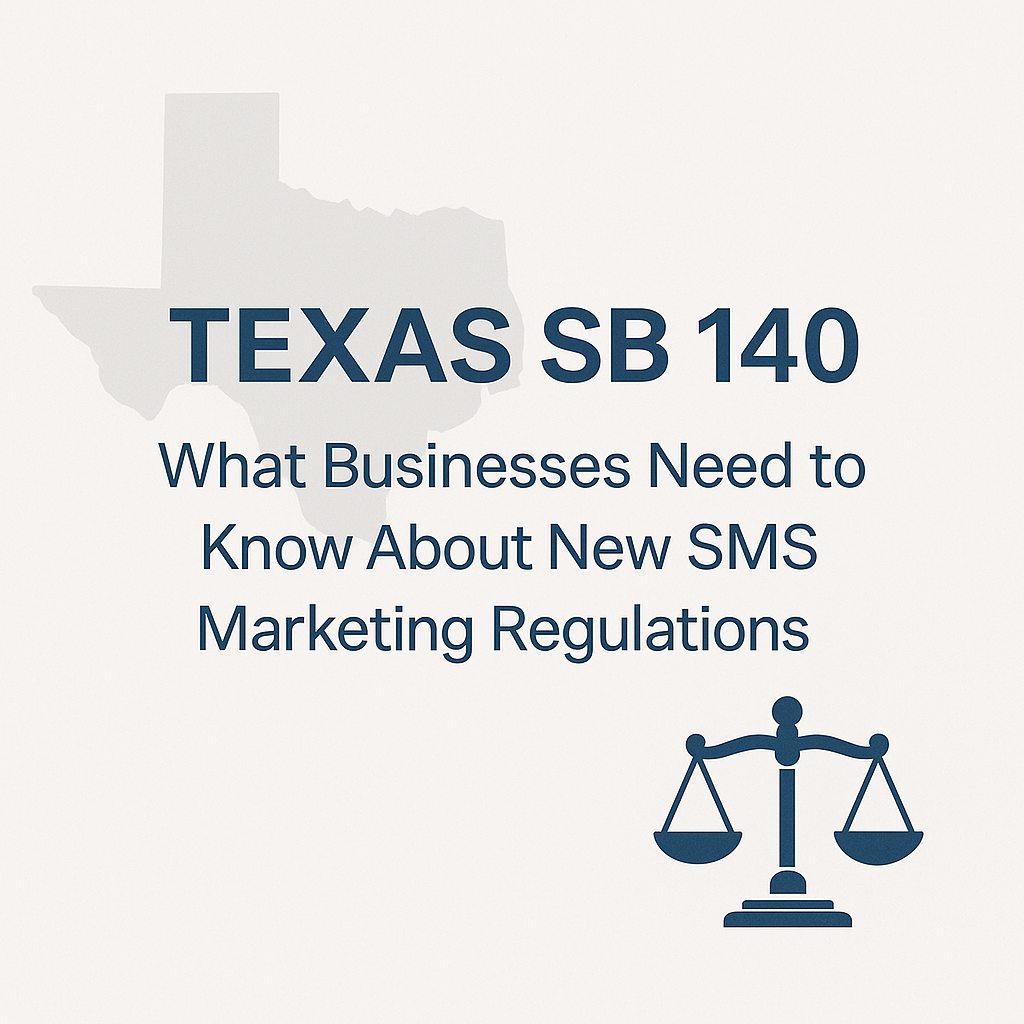
On September 1, 2025, Texas Senate Bill 140 (SB 140) takes effect, significantly changing the way businesses can use SMS, MMS, and RCS messaging for marketing. The law expands the definition of “telephone solicitation” under Chapter 302 of the Texas Business & Commerce Code to include text-based communications. For organizations that rely on text messaging to reach customers, this legislation introduces stricter requirements, higher risks, and new compliance obligations.
Previously, the law applied primarily to phone calls. With SB 140, text messages, multimedia messages, and other digital communications are now considered telemarketing. This means:
Any promotional text messages to Texas residents fall under solicitation rules.
Consumers gain stronger protections and a clearer legal pathway to pursue claims for unwanted or unlawful messages.
Businesses face greater regulatory scrutiny and potential penalties for non-compliance.
Unless exempt, businesses sending marketing texts must:
Register with the Texas Secretary of State (Form 3401).
Pay a $200 annual registration fee.
Post a $10,000 security deposit (such as a surety bond, certificate of deposit, or letter of credit).
Failure to comply can result in fines of up to $5,000 per violation, exposure to lawsuits under the Texas Deceptive Trade Practices Act (DTPA), and potential criminal liability.
SB 140 does provide exemptions for certain entities, including:
Publicly traded companies and their subsidiaries.
Financial institutions, educational institutions, and 501(c)(3) nonprofits.
Food-related businesses marketing food products.
Retail businesses that have operated under the same name for two or more years with a physical location and primarily in-person sales.
Businesses communicating with current or former customers, provided the business has operated under the same name for at least two years.
It is important to note that the definition of “customer” is not fully clarified, and businesses bear the responsibility of proving exemption if challenged.
Beyond registration, SB 140 imposes strict operational rules:
Consent and documentation: Maintain clear, time-stamped records of opt-ins.
Opt-outs: Promptly process unsubscribe requests.
Do Not Call lists: Marketing texts must respect the Texas Do Not Call registry.
Quiet hours: Messages cannot be sent before 9 a.m. or after 9 p.m. local time.
Enforcement: Courts may award triple damages for willful violations, along with attorney’s fees.
If you use Appointment Reminder to send SMS messages to clients in Texas, SB 140 is an important law to understand. While its primary intent is to regulate marketing texts, the definition of “telephone solicitation” is broad enough to capture many types of text messaging.
For most Appointment Reminder customers, appointment reminders should fall under the “existing customer” exemption in SB 140. Because reminders are transactional and tied to an existing relationship, they are less likely to be considered marketing solicitations. However, there are important compliance considerations to keep in mind:
SB 140 provides an exemption for businesses that have operated under the same name for at least two years and are contacting current or former customers. Appointment reminders generally fall within this category, as they are transactional in nature and tied to an existing business relationship. However, if your reminders include promotional language (for example, offering discounts, upsells, or advertising new services), they may be considered marketing messages and could trigger registration requirements.
Even if you qualify for an exemption, consent management is critical. Your clients should have explicitly opted in to receive appointment reminders, and you must honor opt-out requests immediately. Appointment Reminder’s platform makes this process straightforward, but SB 140 heightens the importance of maintaining accurate records of consent.
Messages to Texas residents must respect state Do Not Call rules and time-of-day restrictions. Appointment reminders scheduled outside the permitted hours (before 9 a.m. or after 9 p.m. local time) could create compliance issues. Customers should review reminder schedules to ensure they align with the new regulations.
The highest compliance risk comes when transactional appointment reminders are combined with promotional content in the same message. For example, including “Your appointment is confirmed for Tuesday at 3 p.m. — mention this text for 20% off your next service” could be viewed as marketing, not a simple reminder. To reduce risk, keep appointment reminders strictly informational (date, time, location, instructions), and send promotions separately to customers who have clearly opted in to receive marketing texts.
⚖️ Legal Disclaimer: This information is provided for educational purposes only and does not constitute legal advice. Each business is responsible for its own compliance with SB 140 and other applicable laws. If you are uncertain whether your messaging practices qualify for an exemption or require registration, you should consult with a qualified attorney.